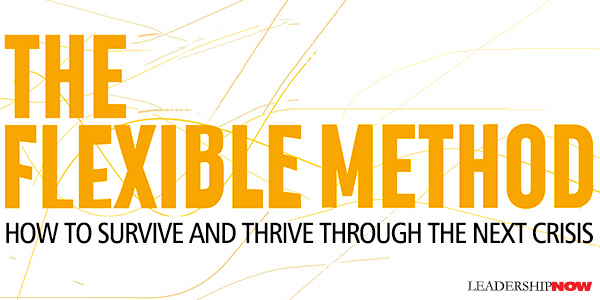 |
 |
10.20.23

The Flexible Method: How to Survive and Thrive Through the Next Crisis
SOMETIMES you can see it coming. More often than not, you can’t. But you can be prepared and follow a method to futureproof your business against the next crisis. James Burstsall, the CEO of Argonon, an independent production group, offers what he calls The Flexible Method. It is a way through the next crisis you will face. Argonon fared better during the pandemic than most of the other organizations in their industry using this method. A crisis is a time for deepening your core values, not abandoning them. The importance of maintaining your values during a crisis is a key factor for taking your team on the difficult journey with you. In crises, winning organizations act like start-ups. Prepare Now The first step is to prepare. So, the time is now to think about this. Have a disaster recovery plan. [template] Develop a procedure for every contingency. Create a flexible mindset culture. Adapt. Stay aware of world events and heed the signs. When Disaster Strikes Always Put Your People First. Your people are everything. When disaster strikes, get them to safety—you need them healthy, aligned, and ready. Leave no one behind. “For teams to be resilient, they have to feel it is worthwhile to make the effort to be so. They are more likely to do this if they are being valued and supported in a people-focused company.” Gather Your Generals. Gather together and empower your bravest thinkers. Listen with an open-mind and be open to radical ideas. Lead with calm and purpose—not overreacting. Make each action part of an evolving narrative towards deadlines that everybody can understand and buy into. Communicate, Communicate, Communicate. During a crisis, people have a heightened need for good, honest communication that gives them information, guidance, helps them adjust and cope emotionally.” Be honest and transparent. That doesn’t mean spilling your guts. Protect Your Cash. Eliminate all unnecessary expenses. Talk with debtors, creditors, suppliers, and the bank. Negotiate flexible terms. Look for hidden assets that you can repurpose. Learn From History. Take lessons from the past to constructively plan for the future. “The experience and learnings we are still distilling will prove invaluable tools in the future.” Hold On to Your Values. “Core values cut across all departments of your business and can unify otherwise separate entities, bringing the whole together.” They are your compass in decision-making. Collaborate and Connect. The temptation is to baton down the hatches and wait for the storm to pass—but both experience and research from the pandemic and the 2008 financial crisis show that collaborating with others can be a path to growth during disaster. Adapt. Be open to new ideas. Understand, too, that some people will not like some of the decisions. Act like a start-up. Supercharge Your Creativity. When adapting is no longer enough, you are going to need an arsenal of fresh ideas. Have the confidence to innovate, think, and experiment. Seek Help. “In a crisis, it is a positive strength to reach out for help rather than stubbornly struggle alone. It demonstrates that you are a realist and a pragmatist. Both of these positions are core tools of the Flexible Method.” Take whatever the government offers and challenge them for more. Find other backers. Seek non-financial help, such as legal, commercial, and medical expertise. Care For Your Team’s Mental Health. Another way of putting people first. Be on the lookout for those who are struggling. Be empathetic and listen. Mind Your Own Health. “Caring for yourself can boost your productivity, memory, focus, creativity, empathy, and decision-making—in other words, your overall effectiveness as a leader.” Emerging From a Crisis Set Your Future Course. Emerging from a crisis, assess the post-crisis landscape and identify new opportunities. Rest, Reward, Review. Thank your exhausted team and encourage them to take a break. Reward them authentically for their tireless work and dedication. Assess what you did right and what you can do better next time. Things have changed, so capture the learnings and forge them into your organization’s new DNA. Then, get back to prepare for the next crisis. 
Posted by Michael McKinney at 07:14 AM
|
BUILD YOUR KNOWLEDGE
 

How to Do Your Start-Up Right STRAIGHT TALK FOR START-UPS 
Grow Your Leadership Skills NEW AND UPCOMING LEADERSHIP BOOKS 
Leadership Minute BITE-SIZE CONCEPTS YOU CAN CHEW ON 
Classic Leadership Books BOOKS TO READ BEFORE YOU LEAD |